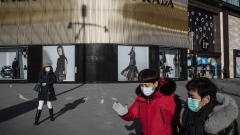Jul 17, 2020
The best ad slogans to get Americans to wear masks
Bloomberg News
Money and Marketing: New ad campaigns promote masks and distancing
Anthony Fauci, perhaps the most trusted public health official in America, says everybody should wear a mask, and research shows that widespread use of face coverings would help stop the spread of the coronavirus. Even so, many Americans still aren’t doing it. Only 65 per cent of U.S. adults say they have worn a mask in stores or other businesses all or most of the time in the past month, according to a June survey by the Pew Research Center.
To convince the holdouts and skeptics to cover their faces, Bloomberg News turned to experts in an industry that’s all about changing people’s behaviour: advertising. While New York Governor Andrew M. Cuomo debuted a series of commercials this week to urge Americans to wear face coverings in public, here is how a few modern-day Don Drapers would craft an ad campaign of their own.
The Virus Stops Here
In the world of advertising, Joel Machak is famous for a campaign that saved lives. In the 1980s, he co-created the Crash Test Dummies ad campaign, one of the most successful public-service announcements of all time. To motivate people to wear masks, Machak suggested a slogan which could be printed on masks or on metal pins that could be attached to masks: “The virus stops here.” He said he once saw the catchphrase used in an online video and thinks it would be psychologically effective.
“This allows the wearer to own the action and make it part of their identity,” said Machak, who is executive creative director at Crosby Marketing. “It’s also a true expression of the benefit of mask wearing.”
Part of the ad campaign, he said, could involve making short videos showing how to correctly wear a mask, for example, by fully covering an individual’s nose. Such messages could be blasted across social media. He also advised investing in product placement. Actors could wear face coverings while shooting scenes for movies and TV shows. Celebrities could don stylish masks while being photographed by paparazzi.
“If it’s done well, this kind of simple information campaign can normalize the behavior so people realize this is something that we just do,” Machak said.
Protect America. Wear It For Your Mother.
Gerry Graf is known for, among other things, helping create the “New York Miracle” ad campaign, which promoted tourism in the city in the aftermath of the Sept. 11 attacks.
With the country suffering through another dark period, Graf's idea for getting people to wear masks is to make it all about patriotism and moms.
Wearing a mask has become politically polarizing. To reverse that, Graf suggested getting the military involved in commercials because respecting the troops is one of the few topics that most everyone agrees on. Including the military might also resonate with the politically conservative Americans who have been hostile to mask wearing.
“My first thought is to have our military promote it by saying, ‘We’re out here protecting America. You could do the same thing in America and wear a mask,’” said Graf, the founder and former chief creative officer of Barton F. Graf, an ad agency that recently closed.
As part of the campaign, he said, you could distribute masks with the American flag printed on them. “That way people can say, ‘I’m doing this for a bigger cause,’” he said.
Even with the coronavirus case load and death toll growing, many people don’t know someone who has been affected by it, making it harder for them to take the danger seriously. To overcome this, Graf proposed making an ad campaign that’s focused on moms, since older Americans are more vulnerable to the virus. The slogan: “Wear it for your mother.”
“Everyone has a mom,” he said. “It’s a more emotional way of getting people to think about other people.”
Graf said he’d buy commercial time on Fox News, which has been accused of downplaying the threat of the virus to its viewers. He also recommended buying ads on Instagram and anywhere that the U.S. military appears in the media.
Just Wear the Damn Mask
Tony Mennuto, president of the ad agency Wordsworth & Booth, said his campaign would focus on two groups of Americans who are often seen on the news not wearing masks: (1) the “Karens,” a slang term for entitled White women caught in viral videos ranting against mask requirements, and (2) young people.
Mennuto, whose agency has done radio ads recently on the importance of hand washing and social distancing, suggested making an ad with a woman throwing a party for her nephew and saying, “No one can tell me what to do.” Then, a narrator would come on and announce that her uncle or brother got the virus at the party and died. Another idea, he said, would be to make a spot in which a college student says he went partying during spring break and then adds, “Little did I know I spread the coronavirus to 20 people.”
To reach twentysomethings, Mennuto proposed buying ads on Spotify and Pandora and making TikTok videos or preroll video ads on YouTube. To reach the “Karens” of the world, he would buy radio ads in the Sun Belt where cases of coronavirus are on the rise, and women would hear the commercials while driving.
The message of his ad campaign would be blunt: "Just wear the damn mask."





